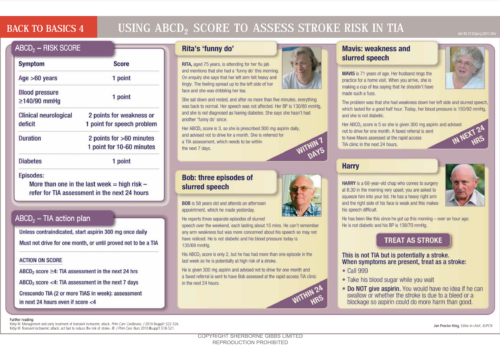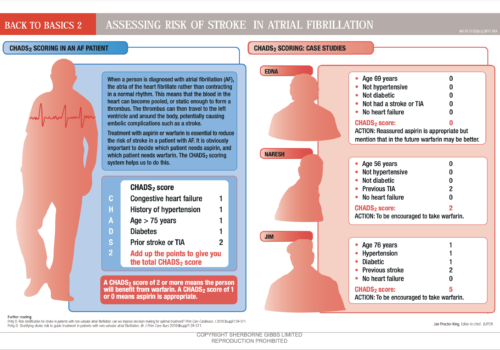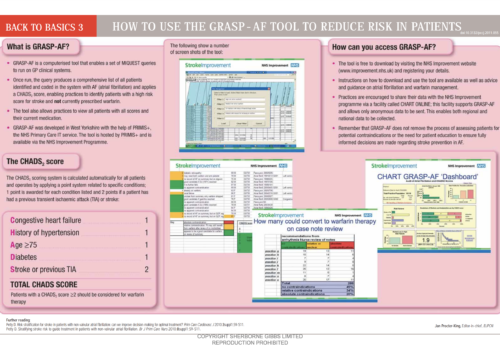In this new series, BJPCN interviews key people leading major initiatives in the prevention and treatment of CVD and diabetes. Alastair Bailey, who leads the Brain Attack Team (BAT) at Leeds Teaching Hospitals Trust explains how the team ensures that patients with stroke receive prompt thrombolytic treatment to improve outcomes.
Back to Basics: Planning the seasonal flu vaccination campaign
The big hitters for quitters
The impact of smoking on all aspects of health – physical, psychological and socioeconomic – is so serious that helping people to quit is a key priority for anyone working to improve health outcomes. In this article, we look at the best way to encourage smokers to quit, how to increase the quit rate in smokers who have decided that the time is right for them to stop, and review the latest information on pharmacological options for smoking cessation.
Raising the issue with patients: let’s talk about sex
The quality of many of our patients’ lives would improve if they had the choice and ability to be sexually intimate. It is relatively common for men who suffer from cardiovascular disease or diabetes to suffer from erectile dysfunction (ED). They often feel too ashamed to initiate sex with their partner, or start a new relationship, because they are unable to gain or maintain an erection. They can become socially isolated and aviod physical contact. As healthcare professionals, we owe this group of patients an opportunity to talk about their sexual problems and to offer them support and treatments. But how do we open up a discussion about sex?
Motivating women and men: what presses the right buttons?
Getting people to act on advice is a continuing challenge for health professionals, particularly in the self-management of chronic conditions. In this article, we explore why men are less likely than women to fully engage with their own health needs and what health professionals can do to help men get better at this. Using the behavioural theory of communication – the Theory of Primitive Concerns – we will look at how different responses to risk – with women typically being risk-averse and men being risk-seeking – mean they respond differently to two alternative styles of clinical instruction based on using ‘power language’ and ‘safety language’. The theory is that we can help men to look after their own health by using language that matches their attitude to risk and presents self-care in a more powerful way.
Back to Basics: Using ABCD2 score to assess stroke risk in TIA
Back to Basics: Assessing risk of stroke in atrial fibrillation
Back to Basics: How to use the GRASP – AF tool to reduce risk in patients
Proteinuria: should it replace cholesterol as a marker for people at high risk of CVD?
We have all seen paintings of early physicians looking at flasks of urine to give an indication of a person’s health. And most of us can remember days of rows of urine pots lined up to test for new patients in primary care and in hospital outpatient clinics. We may assume that those days have gone in the era of blood testing and CT scans. So why are we suggesting that urine testing has a central role in finding patients with previously undiagnosed cardiovascular disease?
Editorial – Going back to basics in cardiovascular disease
There are 28 cardiac and stroke networks in the country. They play an important part in implementation of national strategies, enabling high-quality services to be planned and delivered to patients within the framework of primary and community care. One of the most useful contributions of the networks is provision of education and training for primary care staff. The “Back to Basics” material in this supplement forms the backbone of what is presented at study days. The articles cover some of the most common cardiovascular conditions that are seen in primary care, showing clearly what causes the symptoms, how best to assess and manage patients, and how the treatments actually work. They help healthcare workers both to understand these conditions and to explain them to patients, and therefore really improve patient care.
Editorial
This educational supplement is brought to you by the Cardiac and Stroke Network. What is this Network, and how can it further support your education and development?
Editorial
Chronic kidney disease (CKD) has shot up the primary care agenda over the last few years, and is now well recognised as an independent risk factor for cardiovascular disease (CVD). At the same time, CVD is a risk factor for progression of CKD. The close links between CKD and CVD mean we have to get to grips with assessing patients’ kidney function and ensuring those with CKD receive the treatment needed to prevent progression. This special issue devoted to CKD is full of step-by-step guides and illustrated articles to help you get to grips with this important condition.
























